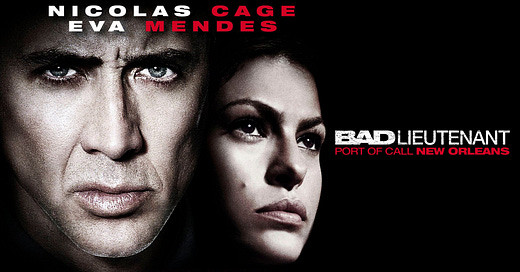Bad Lieutenant: Port of Call New Orleans
Can you make good cinema from a Grand Theft Auto screenplay?
Directed by Werner Herzog
United States, 2009
Well we got off to a blistering start this week with Nicolas Cage putting in a larger than life performance playing … Nicolas Cage. Mixed views from the team: is this a juvenile entertainment, an amuse-bouche before more substantial fare, or is it a piece of pulp-fiction in the original sense, which despite a sketchy plot allowed a diverse crew of character actors and a surreal spin by the director to mesmerise the audience? Can you make good cinema from a Grand Theft Auto screenplay?
You may or may not have seen Harvey Keitel in the original film but notwithstanding the title it is clear from the start that this is no sequel. New York is now a post-Katrina New Orleans and the photography makes for a post-apocalyptic backdrop. The film starts with a seemingly out of character act of beneficence by police sergeant Terence McDonagh (Cage). Unfortunately this leads to him sustaining a severe back injury, a narcotics addiction and a seeming crash-and-burn slide to his doom. From five minutes in Cage adopts a crooked back posture as if to emphasise (figuratively or literally – take your pick) that as so many times in his career he is carrying this film. His performance is all over the place, both physically and vocally, but he is nothing if not intensely watchable. Cage reportedly likes to improvise on set and that is plainly on display here. In one scene he terrorizes a pair of older women with his Magnum and the C-word. Asked about their response to his performance he comes back with, "They're actresses, so they like to play scared." Werner Herzog’s early films all featured the actor Klaus Kinski as his muse – he described Kinski as ‘a monster and a great pestilence’. In Cage Herzog has found a worthy, although more manageable, successor.
Shots from Herzog’s ‘Man and Nature’ documentaries bleed into Bad Lieutenant 2. Snakes, crocodiles and iguanas all have cameo roles but are they real or imagined? And there is something reptilian both in Cage’s character and performance. We all expected the narrative to take a dark turn, given the themes of addiction, prostitution and sexual assault, but the tone remains comedic along with a facile plot resolution and the now police captain McDonagh coming out on top. The beguiling closing scenes leave us on an uncertain note. Despite winning the crown – and the girl – Cage looks lost and and asks plaintively, “Do fish have dreams?” The film plays out with an acoustic blues and Cage sitting in the deep blue New Orleans Aquarium watching the sharks swim by.
Reids’ Results (out of 100)
C - 58
T - 66
N - 72
S - 70
Thanks for reading Reids on Film. If you enjoyed it please share with a friend and do leave a comment.




